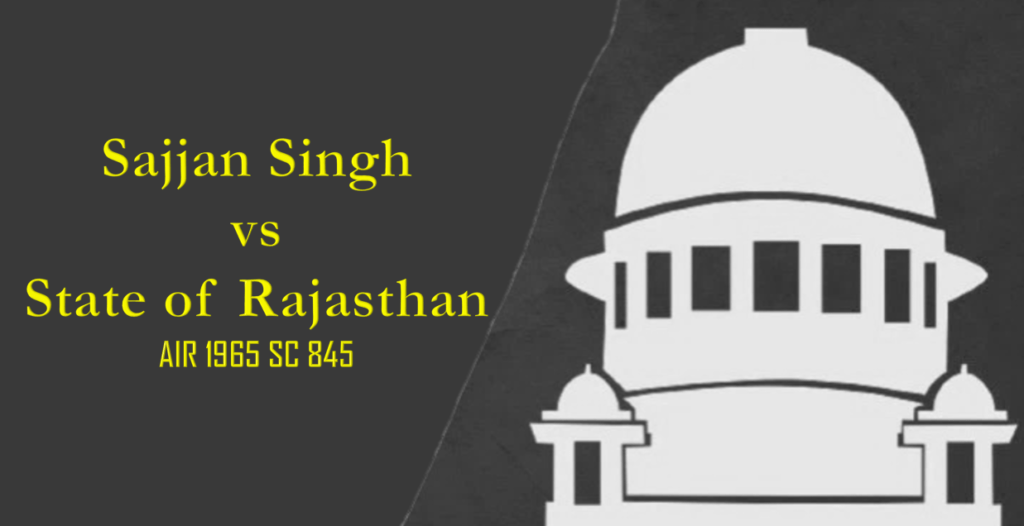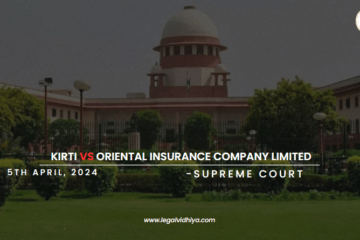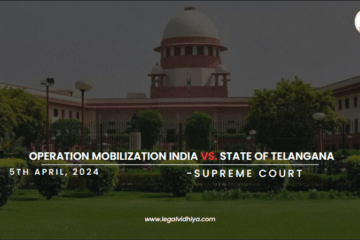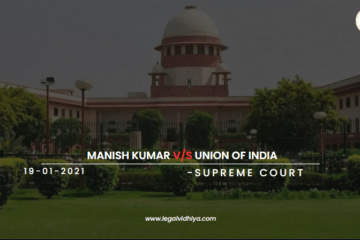

Introduction:
- The case of Sajjan Singh vs State of Rajasthan was heard by the Supreme Court of India in 1965.
- The case involved a challenge to the validity of the Constitution (26th Amendment) Act, which abolished the princely privileges and privy purses of the rulers of the former princely states.
- Sajjan Singh, the ruler of the princely state of Ratlam, challenged the validity of the 26th Amendment Act in the Supreme Court, arguing that it violated his fundamental rights guaranteed under the Indian Constitution.
- The case was heard by a bench consisting of Chief Justice P.B. Gajendragadkar and Justices K.N. Wanchoo, M. Hidayatullah, J.R. Mudholkar, and Raghubar Dayal.
- The judgment in the case was delivered on 30th March 1965, and is reported in AIR 1965 SC 845.
- The case is significant for its impact on the process of integration of the princely states into the Indian Union, and for its implications for the supremacy of the Constitution over other laws and agreements.
Facts:
- Sajjan Singh was the ruler of the princely state of Ratlam, which was later integrated into the Indian Union.
- In 1949, Sajjan Singh signed an agreement with the Indian government which granted him certain privileges and powers, including the right to receive an annual privy purse.
- In 1954, the Constitution (26th Amendment) Act was passed, which abolished the princely privileges and privy purses of the rulers of the former princely states.
- Sajjan Singh challenged the validity of the 26th Amendment Act in the Supreme Court, arguing that it violated the fundamental rights guaranteed to him under the Indian Constitution.
Issue:
- Whether the 26th Amendment Act, which abolished the princely privileges and privy purses of the rulers of the former princely states, is constitutional or not?
Contentions of the Petitioners:
The petitioner Sajjan Singh contended that the 26th Amendment Act, which abolished the princely privileges and privy purses of the rulers of the former princely states, violated the fundamental rights guaranteed to him under the Indian Constitution. The contentions of the petitioners are as follows:
- Violation of Article 14: The petitioner contended that the 26th Amendment Act violated the fundamental right to equality guaranteed under Article 14 of the Constitution. The petitioner argued that the abolition of the privy purses of the former rulers of the princely states was discriminatory and arbitrary, as it affected only a specific class of individuals.
- Violation of Article 19(1)(f): The petitioner said that the abolition of the privy purses violated the fundamental right to property guaranteed under Article 19(1)(f) of the Constitution. The petitioner argued that the privy purses were a part of the property of the former rulers, and their abolition amounted to deprivation of property without compensation.
- Violation of Article 31: The petitioner claimed that the abolition of the privy purses violated the fundamental right to property guaranteed under Article 31 of the Constitution. The petitioner argued that the privy purses were a part of the property of the former rulers, and their abolition amounted to compulsory acquisition without compensation.
- Non-justiciability of the agreement: The petitioner contended that the agreement signed between the former rulers and the Indian government, which granted them certain privileges and powers, was a valid and enforceable agreement. The petitioner argued that the agreement was not subject to review by the courts, as it was a matter of executive policy.
- Non-justiciability of the constitutional amendment: The petitioner argued that the 26th Amendment Act was not justiciable, as it was a constitutional amendment, and therefore, beyond the scope of judicial review. The petitioner argued that the amendment was a matter of political expediency and policy, and the courts had no jurisdiction to interfere with it.
Contentions of the Respondents:
The state argued that the 26th Amendment Act was constitutional and valid for the following reasons:
- The princely privileges and privy purses were inconsistent with the democratic principles and the Constitution of India. The privileges were based on the birth of the ruler, which was discriminatory and violated the principle of equality before the law.
- The princely privileges and privy purses were granted by virtue of treaties with the British government and not by the Indian Constitution. Hence, the Indian government was not bound to continue these privileges after the integration of the princely states into the Indian Union.
- The abolition of the princely privileges and privy purses was a necessary step for the process of integrating the princely states into the Indian Union. The Indian government had to ensure that all the citizens of the country were treated equally and no one was given special privileges on the basis of their birth.
- The respondent also argued that the abolition of the princely privileges and privy purses did not violate the fundamental rights guaranteed under the Indian Constitution. These privileges were not considered as rights in the first place, and hence their abolition did not violate any fundamental right of the erstwhile rulers of the princely states.
Ratio Decidendi:
In the case the ratio decidendi of the Supreme Court’s bench judges was that the 26th Amendment Act, which abolished the princely privileges and privy purses of the rulers of the former princely states, was constitutional and valid.
The Court held that the princely privileges and privy purses were inconsistent with the democratic principles and the Constitution of India, which guarantees equality before law and prohibits discrimination on the basis of birth. The Court also observed that the princely rulers had no special claim to privileges or powers merely on the basis of their birth, and that their privileges and powers were granted by virtue of treaties with the British government.
The Court further held that the Indian government was justified in abolishing the princely privileges and privy purses as a part of the process of integrating the princely states into the Indian Union. The Court also held that the abolition of the princely privileges and privy purses did not violate the fundamental rights guaranteed under the Indian Constitution, as these were not considered as rights in the first place.
Judgment:
In Sajjan Singh vs State of Rajasthan, the Supreme Court of India upheld the validity of the 26th Amendment Act, which abolished the princely privileges and privy purses of the rulers of the former princely states. The Court held that the princely privileges and privy purses were inconsistent with the democratic principles and the Constitution of India, which guarantees equality before law and prohibits discrimination on the basis of birth.
The Court observed that the princely rulers had no special claim to privileges or powers merely on the basis of their birth, and that their privileges and powers were granted by virtue of treaties with the British government. The Court held that the Indian government was justified in abolishing the princely privileges and privy purses as a part of the process of integrating the princely states into the Indian Union.
The Court also held that the abolition of the princely privileges and privy purses did not violate the fundamental rights guaranteed under the Indian Constitution, as these were not considered as rights in the first place. The judgment had far-reaching implications for the process of integration of the princely states into the Indian Union and strengthened the position of the Union government vis-à-vis the erstwhile rulers of the princely states.
Impact:
- Abolition of Princely Privileges and Privy Purses: The Supreme Court’s decision upheld the Indian government’s decision to abolish the princely privileges and privy purses of the rulers of the former princely states. This decision played a crucial role in the integration of the princely states into the Indian Union and paved the way for a more democratic and egalitarian society.
- Protection of Democratic Principles: The Supreme Court’s decision upheld the democratic principles of equality and non-discrimination, establishing the supremacy of the Constitution over any other laws or agreements. This strengthened the position of the Union government vis-à-vis the erstwhile rulers of the princely states.
- Strengthening of Fundamental Rights: The judgment in the Sajjan Singh case clarified the scope and extent of fundamental rights guaranteed under the Indian Constitution. The Court held that the abolition of the princely privileges and privy purses did not violate any fundamental rights as these were not considered as rights in the first place.
- Historical Significance: The judgment in the Sajjan Singh case was a landmark decision in the history of India’s constitutional development. It played a significant role in shaping the relationship between the Union government and the erstwhile rulers of the princely states and helped to establish a more egalitarian and democratic society in India.
Overall, the Sajjan Singh vs State of Rajasthan case had a significant impact on India’s constitutional development, strengthening the democratic principles of equality and non-discrimination, and paving the way for a more egalitarian and democratic society.
Conclusion:
The Sajjan Singh vs State of Rajasthan case of 1965 was a landmark judgment that had far-reaching implications for the integration of the princely states into the Indian Union. The case upheld the democratic principles of equality and non-discrimination, and established the supremacy of the Constitution over any other laws or agreements. The judgment also strengthened the position of the Union government vis-à-vis the erstwhile rulers of the princely states.
The Court’s reasoning In this case was based on the fundamental principles of the Indian Constitution, which seeks to create a democratic and egalitarian society. The abolition of princely privileges and privy purses was considered as a necessary step in the integration of the princely states into the Indian Union. The Court held that these privileges were granted by virtue of treaties with the British government and had no basis in the democratic principles of the Indian Constitution.
Overall, the judgment in the Sajjan Singh case established an important precedent for constitutional development in India, and contributed to the ongoing process of building a democratic and equitable society in the country.
Written By: Muskan Kumari, from the ICFAI University, Jharkhand, an intern under Legal Vidhiya




0 Comments